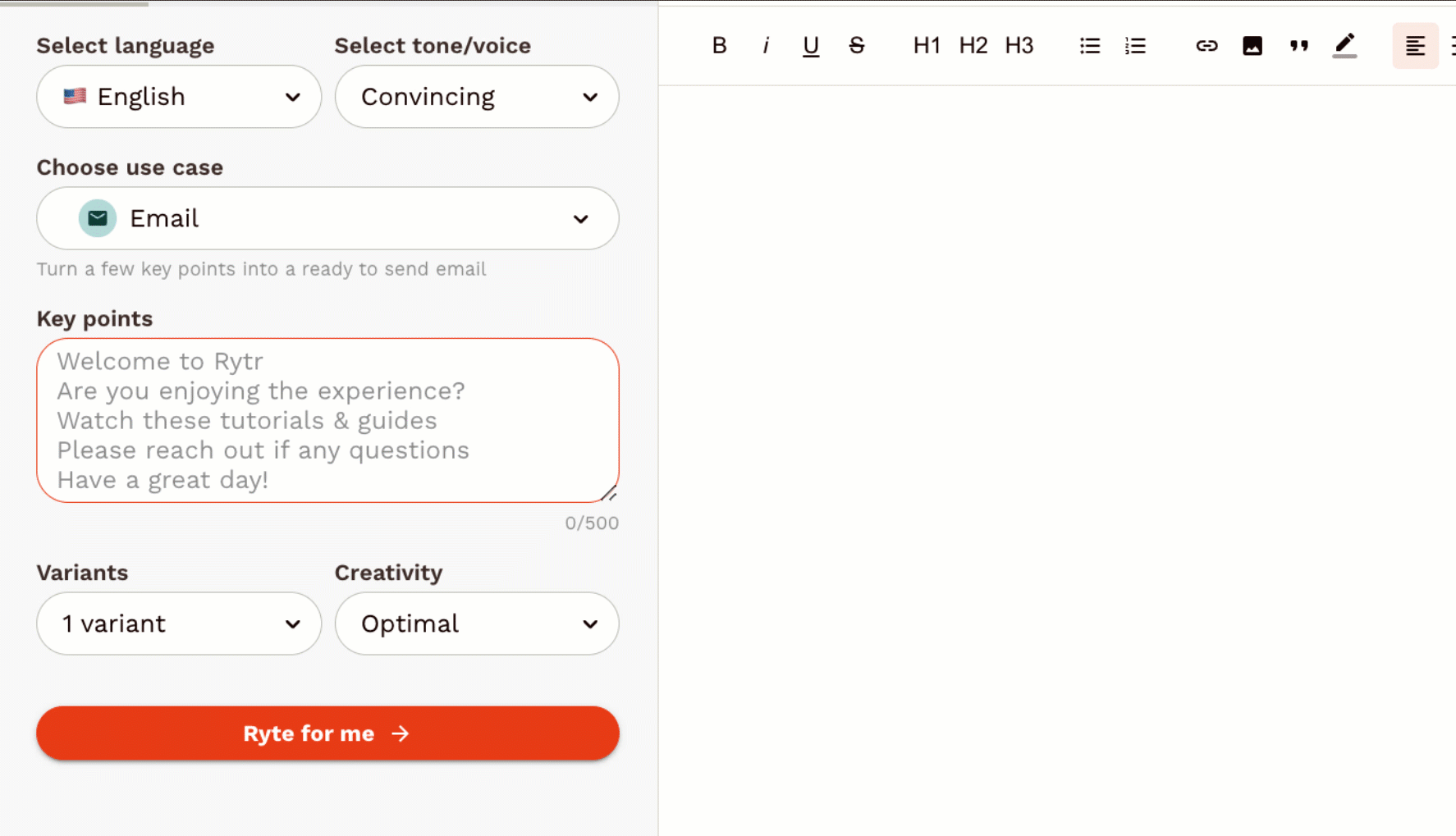Best copywriting tips you haven’t heard before
There's no shortage of content in today's digital world—however, what there is a shortage of is valuable, targeted content. So how can copywriters set themselves apart with compelling content and efficient writing that reaches and persuades their target audience for tangible results? Here is a collection of a the best copywriting tips we've found that will help you level up your blog posts, video scripts, subject lines, social media posts, and beyond:
15 actionable copywriting tips for standout content
1. Simplify your content as much as possible
There's a reason why "keep it simple" is such a well-used phrase—it applies to most things in life, but most especially to copywriting! When you set out to create outstanding content, there's a lot of pressure. How will I stand out? Will readers think I'm credible? Will they take the desired action? It's that pressure that can lead us copywriters to overcomplicate our copy with jargon, longer sentences and unnatural language. In those moments, remind yourself to keep it simple.
Simplifying doesn’t mean you have to remove technical terms altogether, but it involves presenting your message in a way that is both clear and easy to understand. Don't wrack your brain with ways to "say something better/differently/more professionally." Say what your audience needs to hear in the way that is makes the most sense and seems the most natural. This approach helps ensure your audience can quickly and effectively absorb the key details about your selling proposition and the benefits they can gain from it.
2. Further research is absolutely necessary
All exceptional copywriters and advertisers recognize the value of thorough research. David Ogilvy, often hailed as the Father of Advertising, emphasized the need to fill your mind with information to work creatively.
Ogilvy said, “My advice is to start by doing your homework. The more you know about the product, the more likely you are to come up with a big idea for selling it. Study the precedents. Look up the campaigns for similar products in recent years. Find out which worked and which didn’t work, and then go one better. Study the research—how consumers think about your kind of product, what benefit you should promise them.”
To write the best content possible, your writing has to be credible, and that's why you have to know exactly what you're talking about—and as much as you can about your target customer and their customer journey. When you've done all this research, your range of creative options becomes wider. In doing more research and including references to credible sources in your content, the more credible you'll seem to potential customers.
3. Increase the level of interest
Another copywriting tip is to create intrigue. Use it whenever you don’t know what to compose ahead or how to improve your manuscript. “Speak the truth, but make it interesting,” David Ogilvy once said. "You can’t bore folks into purchasing your goods, you know. You could only persuade them to buy it.” So, how can you make your text more exciting and interesting?
- Make it readable and pleasant to the eye.
- Use your unique voice or one-of-a-kind selling proposal to your advantage.
- Make it enjoyable.
- Leverage anecdotes
- Capitalize on Trending News
4. Provide your viewers exactly what they’re looking for
Gary Halbert, a copywriter, has shared a story about what the most important element a restaurant must have to be successful. It wasn't nice cuisine, reasonable prices, or a convenient location. It was, according to Halbert, a hungry audience that is the secret to any restaurant’s success. An owner must begin with a group of people who have expressed a desire to eat, and then fulfill that want. This is because we can only fuel and direct desire as a business; we can’t create it.
A great content writing process takes this into account. If you are writing about a blush product, for instance, you must understand what blush consumers are "hungry for." Do specific colors sell better? What are common complaints? What makes for a best selling blush? Take all this into account to create copy that provides people who consume your content exactly what they’re looking for.
5. Don’t try to be clever
It's true, we want to play with words as writers and content marketers—it's in our natures. And this is sometimes acceptable. But, in most cases, to be clear and concise will pay off more than being clever.
Gary Bencivenga, a million-dollar copywriter, put it this way: Effective copywriting isn’t clever wordsmithing; it’s salesmanship in print. The more self-effacing and inconspicuous your selling ability is, the more successful you will be. Copywriters who flaunt their abilities are like fishermen who expose the hook.
By all means, incorporate your desired, differentiated tone of voice (more on that below), but not at the expense of delivering your message.
6. Ignore the "rules"
Effective writers know when and how to bend the rules of perfect grammar, syntax, and mechanics. This may seem counterintuitive—you may think, "as a professional writer, isn't it my job to know and stick to these rules." But here's the thing: speaking to your customer in terms that relate best to them is more important.
For instance, you may have noticed we started the last sentence with "but." Your fourth grade teacher would deduct points, but because at Copysmith we value writing that is conversational, getting our desired tone across for our target audience is more important than composing things by the book.
7. Anything you write should have a purpose
In today's digital world, having a vast content library is more than beneficial—it's absolutely necessary for any business. But how well that content performs and delivers the desired impact depend entirely on if every item serves a purpose and fits into the larger business and marketing strategy.
“In the current business world, it is pointless to be a brilliant, unique thinker. Unless you can market what you establish,” David Ogilvy observed. On its own, clever, smart content isn’t going to help you. First, make sure your content attracts your viewers, generates trust, and promotes sales.
8. Avoid distractions
When you’re stuck writing, the problem often isn’t always a lack of creativity. The problem is with the lack of time to dedicate to the task. If you’re experiencing problems, Eugene Schwartz’s copywriting tip and productivity hack might help.
Shut the door and switch off your cellphone first. Emails and social media should be closed or signed out. Turn your notifications on your laptop off. In short, remove as many interruptions as you can. After that, take a seat and set a time limit of 30 minutes. The only option you can do with that half an hour is to ponder about it and start working on your writing assignment. Take a 10-minute break after the alarm goes off and then repeat. Schwartz was one of the highest-paid copywriters in the 1950s and 1960s. Thanks to this system, he was able to write for about 3 hours a day, 5 days a week.
9. Make an emotional appeal
As humans, every decision we make is based in emotion. As a copywriter, you must harness the emotions that lead to your desired action. You can draw to a variety of emotions, but the major driving emotions are the strongest. The deepest emotions unaffected by logical thinking are:
- anger
- exclusivity
- fear
- flattery
- greed
- guilt
- salvation
10. Look for the appropriate words
One of the most basic copywriting rules is to avoid using adverbs and adjectives to make a good word better. More words doesn't always mean "better." Instead, find the best or most appropriate word to express the idea, emotion, or images. It might take more time, but it strengthens your writing by making it more fluid and your message effortless to perceive.
Being relentless in the pursuit of the best possible word also makes your writing more professional and trustworthy. For instance, what is more convincing: "Being really sure to pick the best possible word" or "Being relentless in the pursuit of the best possible word"?
Case and point.
11. Make use of active voice
Active voice and passive voice are grammatical constructs that determine the direction of an action in a sentence:
Active voice is a form of writing where the subject of the sentence performs the action expressed by the verb. This structure tends to be more direct and vigorous. For example, in the sentence "The copywriter crafted a compelling headline," the subject, "the copywriter," is actively doing the action of crafting.
Passive voice flips the direction, with the subject receiving the action of the verb. This format often results in less direct and more ambiguous sentences. An example is "A compelling headline was crafted by the copywriter," where the action is received by the subject, "a compelling headline."
Active voice is generally more effective than passive voice in copywriting for several reasons:
- Clarity and Directness: Active voice sentences are usually clearer and more straightforward than passive voice sentences. In active voice, the subject performs the action, making it easier for readers to quickly understand who is doing what. This directness helps convey the message more effectively, leading to better comprehension.
- Engagement: Active voice often creates a more engaging and dynamic tone. It can make the writing feel more lively and immediate, which helps to capture and maintain the reader’s attention—or even create a sense of urgency. This engagement is crucial in copywriting, where the goal is to persuade or motivate the reader to take action.
- Stronger Impact: Active voice tends to be more concise and to the point, giving sentences more impact. This punchiness can be very persuasive, as it allows writers to convey messages powerfully and memorably, which is important for marketing and advertising.
- Action Orientation: Copywriting often aims to prompt some form of action from the reader, whether it’s making a purchase, signing up for a newsletter, or visiting a website. Active voice inherently emphasizes the action, making calls to action more compelling and easier for the reader to follow.
- Sense of Agency: Using active voice can give a sense of agency and responsibility, which can be persuasive in copywriting. It can make statements feel more authoritative and confident, thereby increasing trust in the message or brand.
- Personal Connection: Active voice can also facilitate a sense of personal connection and immediacy. By directly addressing the reader or clearly stating actions, the copy can feel more conversational and relatable, fostering a better connection between the brand and the audience.
In summary, using active voice in copywriting helps in creating clear, engaging, concise, and successful content that drives action and resonates with the audience effectively.
12. Start with your most powerful point
Many authors keep their most powerful points for last when it should be the opposite. Don't bury the lead! More people read the opening of your message than the end, and therefore, presenting your best choice upfront is more compelling. The greatest strength can attract more attention and hook your reader into engaging further.
13. Make use of concrete examples
Resume writers and school administrators recommend adding specific statistics in your CV. That’s because they rapidly show your skills and experience.
This strategy also applies to pretty much any type of writing. “Because so much advertising is imprecise and general,” says Bob Bly. “being particular in your content sets it apart from other commercials and increases attention.”
In a similar vein, professional documentation such as resumes also benefit significantly from explicitness and detailed examples. When it comes to writing impactful resume summaries, focusing on specific achievements and using concrete data can elevate the quality of your job application. Much like precise advertising appeals, a well-crafted resume overview captures attention and solidifies your unique value proposition with relatable experiences.
14. Support your claims with evidence
When you back up your claims with solid evidence, you’ll come out as more assured and trustworthy. This convinces skeptic viewers that you understand what you’re talking about. As you are doing your research for a piece, keep track of any statistics and figures, methods, testimonials, case studies, and success stories that you may find so you can leverage them in your content to back up your assertions. Additionally, linking from your piece to additional resources increases your credibility
15. Leverage AI to enhance your process
There's no doubt that AI has revolutionized the copywriting process by offering tools that enhance creativity and efficiency. Through natural language processing and machine learning, AI can help you generate ideas, draft content, and even customize messaging for specific audiences.
We know there has been a lot of buzz about AI taking over copywriting jobs, but here's the thing: AI cannot fully replace a professional copywriter's human touch or their ability to strategize. It can, however analyze substantial amounts of data and identify patterns and preferences in consumer behavior, that can allow copywriters like you to tailor your content to target demographics with greater precision. This ensures that the messaging resonates more effectively with its intended audience, leading to higher engagement rates.
Furthermore, AI can handle repetitive and time-consuming tasks, such as keyword optimization and formatting, summarizing mass amounts of information, and more. This enables you to focus more on the creative aspects of their work.
Additionally, AI-powered writing assistants provide real-time feedback on grammar, style, and tone, ensuring that the copy is not only well-written but also aligned with brand guidelines.
Over all, leveraging AI in copywriting not only streamlines the workflow but also enhances the overall quality and effectiveness of the content produced.
That is why Copysmith exists: Copysmith is a collection of AI-powered products, empowering content teams to easily produce high quality content across multiple communication channels. Our products include:
- Frase: An all-in-one SEO and AI writing platform that streamlines, accelerates, and scales your entire content workflow, empowering you to boost SEO performance (keyword rankings, organic traffic, and domain authority), support lead generation efforts, and strengthen your brand visibility and authority across channels.

- Describely: Describely helps eCommerce teams to harness the power of AI to create on-brand, high-quality product descriptions in bulk faster than ever. Describely helps eCommerce businesses to fill data gaps, enhance product images, increase search engine visibility, and more.

- Rytr: Rytr is your AI writing assistant for short-form content, accessible anywhere you write. Whether it's business emails, cover letters, social media posts, blog posts or beyond, Rytr helps you generate quality content in your desired tone of voice. It even works as a Chrome browser extension so you can leverage AI directly in Google Docs and beyond!

We hope these tips help you to boost your copywriting skills! If you want to see first hand how AI can enhance your copywriting strategy, get started today!
Frase | Describely | Rytr
Chris Wagner, Head of Content @HostingPill is the original author of this post.